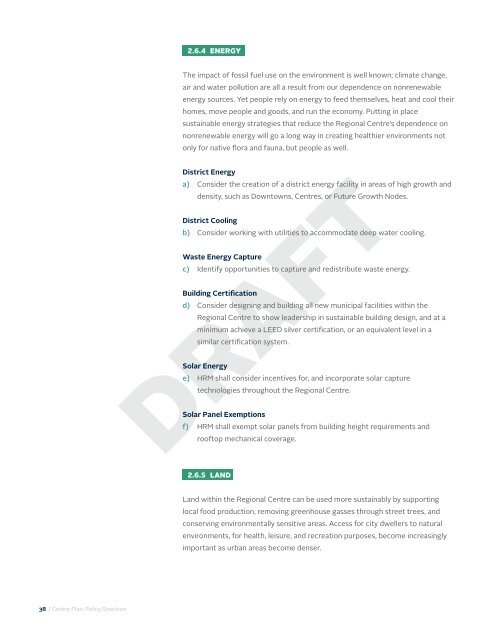DRAFT
policy-direction-draft-booklet
policy-direction-draft-booklet
Create successful ePaper yourself
Turn your PDF publications into a flip-book with our unique Google optimized e-Paper software.
2.6.4 ENERGY<br />
The impact of fossil fuel use on the environment is well known; climate change,<br />
air and water pollution are all a result from our dependence on nonrenewable<br />
energy sources. Yet people rely on energy to feed themselves, heat and cool their<br />
homes, move people and goods, and run the economy. Putting in place<br />
sustainable energy strategies that reduce the Regional Centre’s dependence on<br />
nonrenewable energy will go a long way in creating healthier environments not<br />
only for native flora and fauna, but people as well.<br />
District Energy<br />
a) Consider the creation of a district energy facility in areas of high growth and<br />
density, such as Downtowns, Centres, or Future Growth Nodes.<br />
District Cooling<br />
b) Consider working with utilities to accommodate deep water cooling.<br />
Waste Energy Capture<br />
c) Identify opportunities to capture and redistribute waste energy.<br />
Building Certification<br />
d) Consider designing and building all new municipal facilities within the<br />
Regional Centre to show leadership in sustainable building design, and at a<br />
minimum achieve a LEED silver certification, or an equivalent level in a<br />
similar certification system.<br />
Solar Energy<br />
e) HRM shall consider incentives for, and incorporate solar capture<br />
technologies throughout the Regional Centre.<br />
Solar Panel Exemptions<br />
f) HRM shall exempt solar panels from building height requirements and<br />
rooftop mechanical coverage.<br />
<strong>DRAFT</strong><br />
2.6.5 LAND<br />
Land within the Regional Centre can be used more sustainably by supporting<br />
local food production, removing greenhouse gasses through street trees, and<br />
conserving environmentally sensitive areas. Access for city dwellers to natural<br />
environments, for health, leisure, and recreation purposes, become increasingly<br />
important as urban areas become denser.<br />
38 | Centre Plan: Policy Direction


